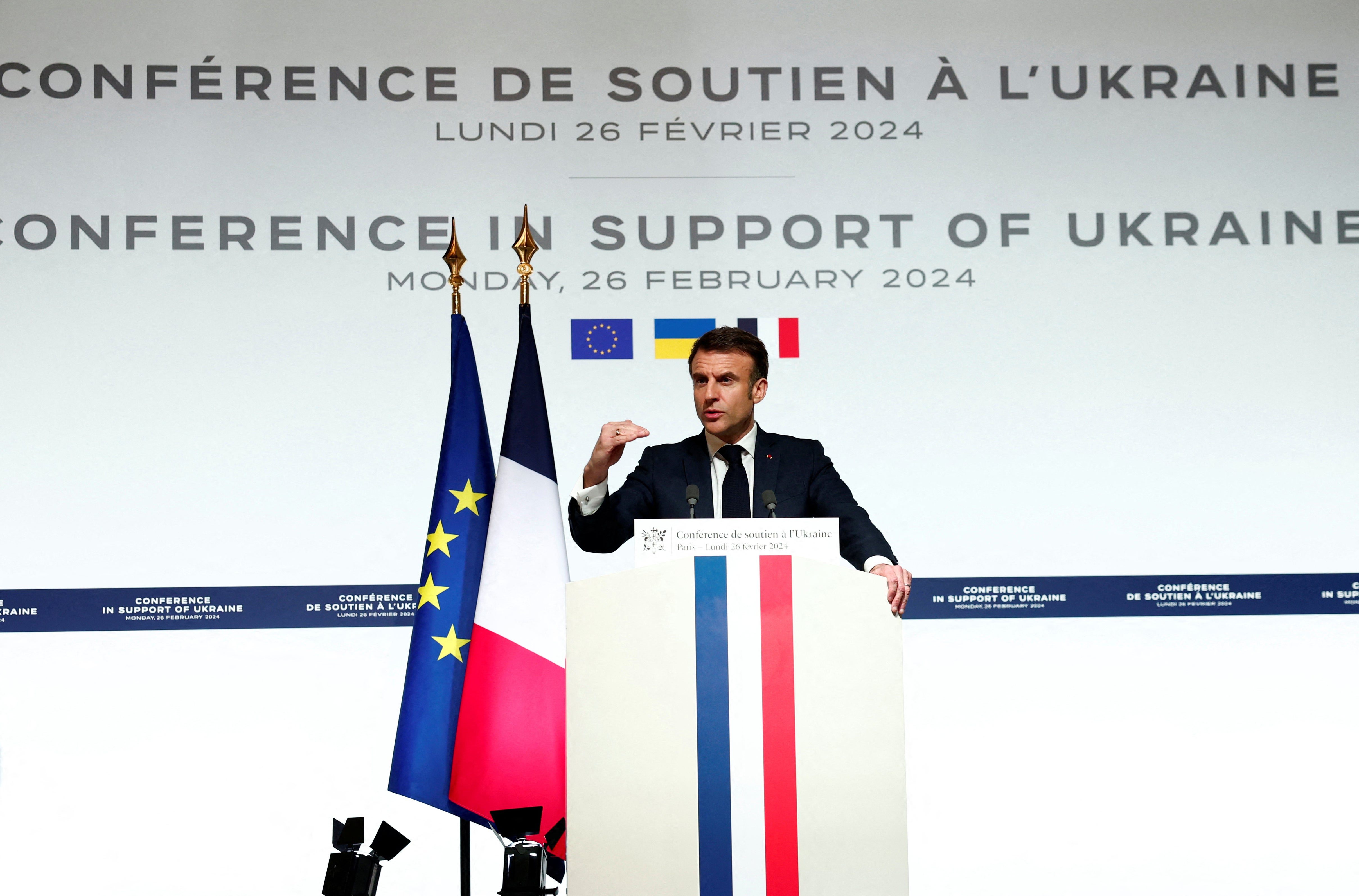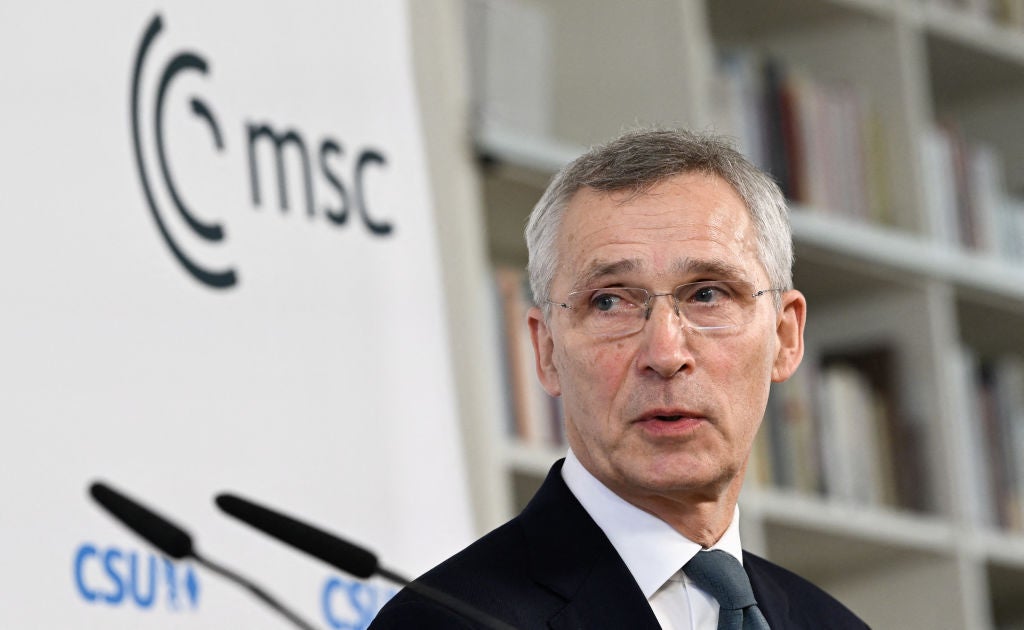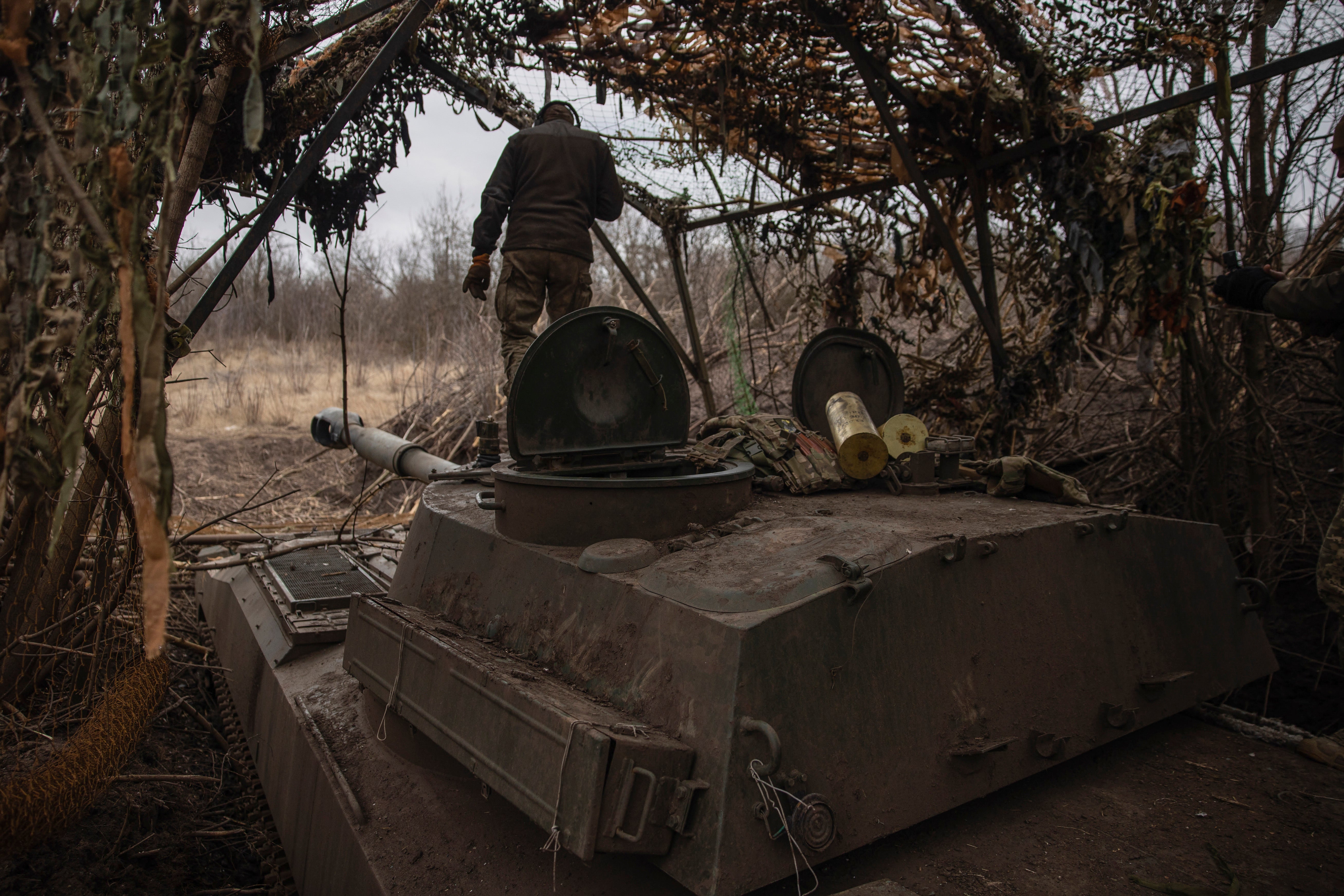European leaders rule out sending troops to Ukraine after Macron suggestion – as Russia warns of war with Nato
It comes as Ukraine’s troops withdraw from three towns in two days as Putin’s forces advance on the eastern front line
Leaders across Europe have lined up to rule out putting troops on the ground in Ukraine after French president Emmanuel Macron announced he was open to the idea of sending soldiers to fight against Vladimir Putin’s forces – as the Kremlin warned of the “inevitability” of a direct war with Nato if such a move took place.
The war of words came as Russian forces expanded their takeover of a section on the eastern front line, further capitalising on Ukraine’s significant artillery disadvantage created by the depletion of Western supplies to the country over the last six months.
Britain, Germany, the head of Nato and several other key allies of Kyiv announced they had no plans to send troops into the fight against Russian forces.
“There are no plans for UK troops to fight alongside the Ukrainian armed forces,” the UK’s Ministry of Defence told The Independent, in comments echoed by Italy, Poland, the Czech Republic, Sweden, and several other European states.
“Nato allies are providing unprecedented support to Ukraine ... but there are no plans for Nato combat troops on the ground in Ukraine,” Nato secretary general Jens Stoltenberg said.

The comments came less than 24 hours after Mr Macron, addressing reporters in Paris after a conference attended by 20 European leaders, said he “could not rule out” sending troops into Ukraine.
“We will do everything needed so Russia cannot win the war,” he told reporters.
Asked if that included sending soldiers, a move that has been avoided out of fear of escalating the conflict, Mr Macron responded: “There is no consensus to send, in an official manner, troops on the ground. But in terms of options, nothing can be ruled out.”
But German chancellor Olaf Scholz suggested the discussions in Paris had reached a different conclusion.
“Once again, in a very good debate, it was discussed that what was agreed from the outset – among ourselves and with each other – also applies to the future, namely that there will be no ground troops, no soldiers on Ukrainian soil sent there by European countries or Nato states,” Mr Scholz said on the sidelines of an event back in Germany.
A former French senior civil servant with knowledge of the talks later told The Independent that the majority of the leaders present in Paris were likely to have been surprised by Mr Macron’s comments. “Most of the other heads of state and government were unaware that the French president was going to make statements along these lines,” he said.
France’s own foreign minister, Stephane Sejourne, sought to clarify Mr Macron’s comments on Tuesday afternoon, saying that soldiers could engage in acts of “mine clearance, cyber defence and the production of weapons on site on Ukrainian territory”.
“Some of its actions could require a presence on Ukrainian territory, without crossing the threshold of fighting,” he said. “Nothing should be ruled out. This was, and still is, the position today of the president of the Republic.”

John Foreman, a former defence attache for the UK in Moscow and Kyiv, described Mr Macron’s comments as a distraction, adding that he was not surprised by the reaction of the French president’s fellow Nato leaders.
“Macron doesn’t speak on their behalf, and there has been no public or private messaging by any European leader that they are thinking of deploying troops to Ukraine,” he told The Independent. “There is a big say/do gap, so I didn’t take this particularly seriously and am not surprised by the reaction of other leaders.”
He pointed to another announcement made by Mr Macron, that France is now supporting initiatives to buy artillery shells for Ukraine from countries outside of Europe, as more significant.

Ukrainian forces have been forced to ration artillery shells on the front line owing to a crippling shortage that has left them with a 7-1 disadvantage against their Russian counterparts.
“We often get only three shells to hit a target, and the expectation is that that will be enough, where they can easily fire 20 shells at one target,” an artillery commander stationed in eastern Ukraine said earlier this week.
Ukraine announced on Tuesday that it had been forced to withdraw from two more villages in the Avdiivka area on the front line, while the city of Avdiivka itself fell earlier this month after a decade of battles.
Military spokesperson Dmytro Lykhovy announced that Ukrainian forces had withdrawn from Stepove and Severne, a few miles from the symbolic town of Avdiivka, which Ukrainian forces withdrew from last week. Ukraine’s southern military commander said they had “stabilised” defensive positions in Tonenko, just over a mile behind Severne, after Russia claimed to have taken over the village.
Meanwhile in Russia, the Kremlin continued its crackdown on dissidents, jailing a veteran human rights campaigner for two years and six months for criticising the war in Ukraine and “repeatedly discrediting” the Russian military
Oleg Orlov, the 70-year-old co-chair of the Nobel Peace Prize-winning human rights group Memorial, rejected the case against him as politically motivated, saying in his closing statement: “I don’t regret anything and I don’t repent anything.” He also denounced the war again.
In a statement, Memorial called Orlov’s sentence “an attempt to drown out the voice of the human rights movement in Russia and any criticism of the state”. It vowed to continue its work.
The verdict drew a crowd of dozens of supporters, including 18 Western diplomats, independent Russian media outlet Mediazona reported.
US Ambassador Lynne Tracy said in a statement: “I am alarmed and concerned by today’s outcome. Oleg Orlov has personally fought for the rights of Russians for more than 45 years.”
Join our commenting forum
Join thought-provoking conversations, follow other Independent readers and see their replies
Comments
Bookmark popover
Removed from bookmarks